|
|
|
Sort Order |
|
|
|
Items / Page
|
|
|
|
|
|
|
| Srl | Item |
| 1 |
ID:
123623


|
|
|
|
|
| Publication |
2013.
|
| Summary/Abstract |
Nonstate actors, such as international non-governmental organizations (INGOs) and multinational corporations (MNCs), have attained an increasingly prominent role in modern world affairs. While previous research has focused on these actors' respective interactions with states, little attention has been paid to their interactions with each other. In this paper, we examine the extent to which the decisions of private actors seeking to invest abroad are affected by the reputational costs of doing business in countries publicly targeted by human rights activists. We find that ''naming and shaming'' by human rights INGOs tends to reduce the amount of foreign direct investment received by developing states, providing evidence that INGO activities affect the behavior of MNCs. An additional implication of our findings is that shaming by INGOs can impose real costs on targeted states in the form of lost investment.
|
|
|
|
|
|
|
|
|
|
|
|
|
|
|
|
| 2 |
ID:
123624


|
|
|
|
|
| Publication |
2013.
|
| Summary/Abstract |
Despite its theoretical and empirical importance, no studies to date have examined the deterrent value of democratic allies. To fill this void, this study concentrates precisely on this issue. The general premise is that challengers select targets based on their expectations about the reliability of their allies. These expectations are, in turn, based on the magnitude of political costs that an ally's leader would pay for failing to honor its international commitments. In democracies, the domestic audience would punish a leader for failing to defend an ally, but only if they care about the issue at stake. For this reason, I argue that democratic allies only effectively deter challenges against those partners that are of a greater strategic importance. In the absence of such strong interests, targets with democratic allies are more likely to be challenged. I find strong support for this argument in a quantitative test from 1816 to 2002. This study also suggests that the findings from previous tests of democratic alliance reliability may need to be interpreted through the lenses of sample selection bias. Challengers initiate disputes when democratic allies have low interests, suggesting the potential for a biased sample that primarily includes the most unreliable democratic allies.
|
|
|
|
|
|
|
|
|
|
|
|
|
|
|
|
| 3 |
ID:
123626


|
|
|
|
|
| Publication |
2013.
|
| Summary/Abstract |
Does perceived corruption in recipient countries reduce support for foreign aid in donor countries? This under-explored yet salient question is examined using the 2009 Eurobarometer survey for the 27 EU countries. We suggest that perceived corruption can cause aid fatigue but that this relationship is highly contextualized. The results show that perceptions about corruption in developing countries reduce overall support for aid among respondents in donor countries. However, this effect is mitigated by country and contextual-level effects and different understandings of what we call the "aid-corruption paradox," namely that the need for foreign aid is often the greatest in corrupt environments. Three different dynamics of the aid-corruption paradox influence support for aid: moral, pragmatic, and strategic understandings. In EU-15 countries, the effect of perceived corruption in recipient states on aid fatigue can be substantially altered if aid is motivated by moral reasons for helping poor countries or if the purpose of aid is understood to improve governance. In new member states (NMS-12), the effect is reduced if respondents believe that the result of aid can serve national interests. The results provide new insights into the public opinion/development policy nexus, which suggest a number of salient policy recommendations and future areas for research.
|
|
|
|
|
|
|
|
|
|
|
|
|
|
|
|
| 4 |
ID:
123616
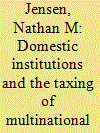

|
|
|
|
|
| Publication |
2013.
|
| Summary/Abstract |
Political scientists have examined how domestic politics and the competition for international capital affect the setting of national tax rates. In this paper, I explore how political institutions, specifically the level of democracy, affect firm-level taxation across the world. I argue that electoral competition leads democratic governments to higher levels of taxation on firms. Using a data set on firm tax payments on the foreign affiliates of US multinational corporations from the US Bureau of Economic Analysis, I show that there are large variations within countries on the tax burdens faced by firms that are not explained by national tax rates. I find evidence that the mobility of the specific investment project, the types of spillovers these investments provide to a community, and attributes of the parent firm are all important determinants of taxation. While firm-level factors clearly affect corporate taxation, I argue that democratic institutions limit the offering of tax incentives and generate electoral benefits to policing tax avoidance by multinational corporations. After controlling for parent firm and foreign affiliate-level factors, I find that democratic countries generate as much as 26% more tax revenues from multinational corporations relative to authoritarian countries.
|
|
|
|
|
|
|
|
|
|
|
|
|
|
|
|
| 5 |
ID:
123629
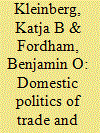

|
|
|
|
|
| Publication |
2013.
|
| Summary/Abstract |
Liberal international relations theory suggests that mutual gains from trade prevent conflict between states. Previous research has focused predominately on international outcomes, especially the occurrence of militarized conflict between pairs of states. How concerns about welfare gains from trade help produce the policy choices leading to these outcomes is less well understood. This paper examines the influence of economic interests arising from international trade on the policy-making process at the domestic level. If the benefits of trade increase the opportunity cost of conflict, then support for a harmonious foreign policy should be strongest among trade's domestic beneficiaries. Those whose income is diminished by trade have no reason to favor a friendly foreign policy and might even prefer a hostile alternative. We test whether the domestic distributional effects of trade affect support for hostile foreign policies toward China among representatives in the US Congress. An analysis of cosponsorship and roll-call voting suggests that the export orientation and import sensitivity of their districts influences members' positions on measures that criticize Chinese policies or treat the country as a security threat.
|
|
|
|
|
|
|
|
|
|
|
|
|
|
|
|
| 6 |
ID:
123620
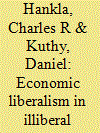

|
|
|
|
|
| Publication |
2013.
|
| Summary/Abstract |
Over the last few decades, a vast literature has emerged examining the relationship between democratic political institutions and trade policy outcomes. While this literature has added significantly to our knowledge, it has effectively ignored policymaking in dozens of important states-those that remain autocratic. This paper fills that hole by exploring the effects of authoritarian variation on national trade policies. Our contention is that more institutionalized authoritarian regimes will tend to adopt more open trade policies. This relationship should hold, we argue, for two distinct reasons. First, we argue that autocratic regimes with larger "selectorates" should have greater incentives to provide public rather than private goods. As a result, we expect that multiparty, and to a lesser extent single-party, autocracies will tend to prefer more open trade policies than non-party (often personalistic) dictatorships, monarchies, and military juntas. Second, we contend that more stable autocratic regimes will have longer time horizons and therefore greater incentives to adopt policies, such as trade openness, that may strengthen long-run economic performance. We find strong support for these arguments using several cross-national time-series models of all autocracies ranging from 1962 to 2007 (contingent on data availability).
|
|
|
|
|
|
|
|
|
|
|
|
|
|
|
|
| 7 |
ID:
123621


|
|
|
|
|
| Publication |
2013.
|
| Summary/Abstract |
Conventional wisdom holds that large margins of electoral victory contribute to presidential power. How does this variation in power impact U.S. foreign policy? I argue here that presidents who win elections by a substantial margin authorize the use of substantial military force more regularly, but do so at the expense of personal diplomacy and low-level crisis engagement. This distinction stems from the variation in the external constraint that other political actors place on these policies. New presidents who are empowered by a decisive election have more leverage and are therefore better able to pursue otherwise constrained foreign policies such as the use of major force. In contrast, those who win by smaller margins have less political capital and are forced disproportionately to the less constrained arenas of diplomacy and crisis intervention.
|
|
|
|
|
|
|
|
|
|
|
|
|
|
|
|
| 8 |
ID:
123628
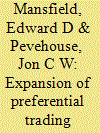

|
|
|
|
|
| Publication |
2013.
|
| Summary/Abstract |
The growing number of preferential trading arrangements (PTAs) since World War II has generated substantial interest in their economic and political effects. It has also prompted interest in the factors that give rise to PTAs, but very little research has been conducted on the growth of extant PTAs. To address this shortcoming, we analyze why some arrangements expand, whereas others do not. We find strong evidence that expansion is most likely when the existing members of a PTA display a high degree of trade openness and when the size distribution of these members is fairly uniform. We also find that PTAs that add new members are likely to do so again in the near future and that, throughout the global system, PTAs tend to expand in clusters. Equally, there is some indication that the market size of a PTA affects its odds of expansion. Finally, we investigate which states join enlarging PTAs. We find that PTAs expand by taking on new members that are economically and politically similar to existing members.
|
|
|
|
|
|
|
|
|
|
|
|
|
|
|
|
| 9 |
ID:
123617
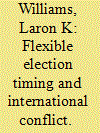

|
|
|
|
|
| Publication |
2013.
|
| Summary/Abstract |
While there are a large number of studies examining the differences in conflict behavior due to varying institutional arrangements, scholars have not effectively addressed the differences in electoral cycles between systems with fixed versus flexible election timing. At the same time that parliamentary regimes give the Prime Minister the power to dissolve parliament, they give the parliament the power to remove the government with a vote of no-confidence. Together, these institutional attributes make the precise timing of the elections-and thus the public's opportunity to hold the government accountable-largely uncertain. I develop a theory that expectations of an upcoming election constrain the foreign policy decision making of executives, and induce pacific behavior. I estimate the probability of an election in a sample of 17 advanced parliamentary democracies from the 1950s to 2001. I find convincing support for my theory, as the probability of hostile dispute initiation is a function of those characteristics that influence the timing of elections, including majority support and the electoral cycle. More specifically, majority and minority governments face varying incentives to initiate disputes because of the different risks of an immediate election.
|
|
|
|
|
|
|
|
|
|
|
|
|
|
|
|
| 10 |
ID:
123630
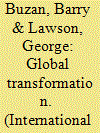

|
|
|
|
|
| Publication |
2013.
|
| Summary/Abstract |
Unlike many other social sciences, international relations (IR) spend relatively little time assessing the impact of the nineteenth century on its principal subject matter. As a result, the discipline fails to understand the ways in which a dramatic reconfiguration of power during the "long nineteenth century" served to recast core features of international order. This article examines the extent of this lacuna and establishes the ways in which processes of industrialization, rational state-building, and ideologies of progress served to destabilize existing forms of order and promote novel institutional formations. The changing character of organized violence is used to illustrate these changes. The article concludes by examining how IR could be rearticulated around a more pronounced engagement with "the global transformation."
|
|
|
|
|
|
|
|
|
|
|
|
|
|
|
|
| 11 |
ID:
123619


|
|
|
|
|
| Publication |
2013.
|
| Summary/Abstract |
Media attention is unevenly allocated across global human rights problems, prompting anger, frustration, and recrimination in the international system. This article demonstrates that from 1981 to 2000, three leading Anglo-American media sources disproportionately covered Latin American abuses, in human rights terms, as compared to other world regions. This "Latin Human Rights Bias" runs counter to broader trends within the Anglo-American general coverage of foreign news, where Latin America's share of reporting is far smaller. The Bias is partially explained by the region's proximity to the United States (US), its relevance to US policy debates, and by path dependency. A significant portion of the Latin Bias remains unexplained, however, despite our best attempts to rigorously model explanations offered by leading Western journalists. These findings suggest that geographic regions are an important factor in the media's perception of global human rights problems and that both human rights policymakers and scholars may be inappropriately drawing general lessons from regionally specific and biased patterns. We conclude with suggestions for future research.
|
|
|
|
|
|
|
|
|
|
|
|
|
|
|
|
| 12 |
ID:
123625
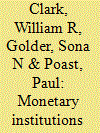

|
|
|
|
|
| Publication |
2013.
|
| Summary/Abstract |
According to the political business cycle literature, survival-maximizing leaders will manipulate whatever macroeconomic policy instruments they have at their disposal in order to retain power. However, an obvious implication of the political business cycle literature has not previously been adequately tested: does having the ability to manipulate macroeconomic policy instruments actually allow leaders to stay in office longer? We argue that elected leaders who have neither fiscal nor monetary instruments available for electoral purposes will find it more difficult to survive in office. We test this claim using data from 19 OECD countries in the latter part of the twentieth century when the degree of capital mobility in the international economy was high. We find that access to macroeconomic instruments does help leaders retain office, but that these instruments are only effective for leaders who have been in office for at least 7 years.
|
|
|
|
|
|
|
|
|
|
|
|
|
|
|
|
| 13 |
ID:
123615
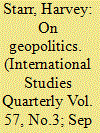

|
|
|
|
|
| Publication |
2013.
|
| Summary/Abstract |
The study of international relations sits at the convergence of human inquiry that crosses both time and space. The aim here is to elaborate on the spatial context of international relations, to contrast it to the temporal context, and to indicate broadly the continuing importance of the geopolitical spatial context to the study of international relations. I briefly demonstrate how this relationship is based not on an earlier approach based on geographic determinism, but rather possibilism-the possibilities presented by the spatial, geographic, and geopolitical context. In elaborating on space and place, I return to the central research focus of my career: the dynamism and importance of the spatial context for understanding international relations, along with the need to take both time and space into account, the need to appreciate both a locational view and the perceptual/symbolic/constructed view of space and place, and to do so within an increasingly globalized, interdependent, and transnational world system.
|
|
|
|
|
|
|
|
|
|
|
|
|
|
|
|
| 14 |
ID:
123618
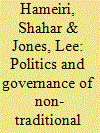

|
|
|
|
|
| Publication |
2013.
|
| Summary/Abstract |
The international security literature has recently observed the growing "securitization" of issues outside the traditional concern with interstate military conflict. However, this literature offers only limited explanations of this tendency and largely neglects to explain how the new security issues are actually governed in practice, despite apparent "securitization" leading to divergent outcomes across time and space. We argue that the rise of non-traditional security should be conceptualized not simply as the discursive identification of new threats but as part of a deep-seated historical transformation in the scale of state institutions and activities, notably the rise of regulatory forms of statehood and the relativization of scales of governance. The most salient feature of the politics of non-traditional security lies in key actors' efforts to rescale the governance of particular issues from the national level to a variety of new spatial and territorial arenas and, in so doing, transform state apparatuses. The governance that actually emerges in practice can be understood as an outcome of conflicts between these actors and those resisting their rescaling attempts. The argument is illustrated with a case study of environmental security governance in Southeast Asia.
|
|
|
|
|
|
|
|
|
|
|
|
|
|
|
|
| 15 |
ID:
123631
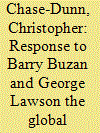

|
|
|
| 16 |
ID:
123622
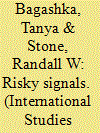

|
|
|
|
|
| Publication |
2013.
|
| Summary/Abstract |
It can be risky for governments to renege on exchange rate commitments, but it is misleading to characterize the costs as audience costs. While an audience costs approach assumes that the punishment for reneging is automatic, we model the choice of exchange rate policy in the shadow of elections as a signaling game between voters and governments, where governments have private information and voters are rational. We find that voters draw different inferences when they see reneging by different actors, and only Left governments are punished for breaking their promises. We test this hypothesis in the context of the post-Communist countries from 1990 to 2007 and find that Left governments were more likely to fall if they reneged on exchange rate commitments, but Right governments were not.
|
|
|
|
|
|
|
|
|
|
|
|
|
|
|
|
| 17 |
ID:
123627


|
|
|
|
|
| Publication |
2013.
|
| Summary/Abstract |
Arms races are costly and inefficient; therefore, standard causal explanations, based on threat perception, are inadequate, as states should prefer to resolve disagreements prior to the onset of these inefficient competitions. Building on recent research, arms races are alternatively conceptualized as a product of uncertainty, used to reveal information. Expectations are derived regarding when arms races should be most likely, allowing for one of the first systematic, quantitative tests of the causes of arms races. Empirical tests support theoretical expectations that arms races are most likely in contexts where there are salient competitive stakes and high levels of uncertainty, such as territorial rivalries or the early tenure of new leaders. The theoretical logic and empirical tests not only produce insights into why states participate in costly and inefficient arms races but also hint at a better understanding of the long puzzling relationship between arms races and war.
|
|
|
|
|
|
|
|
|
|
|
|
|
|
|
|
|
|
|
|
|